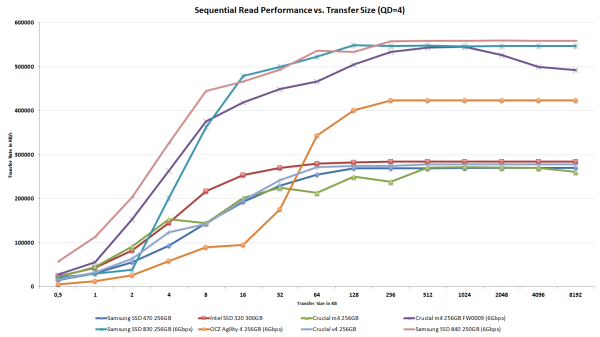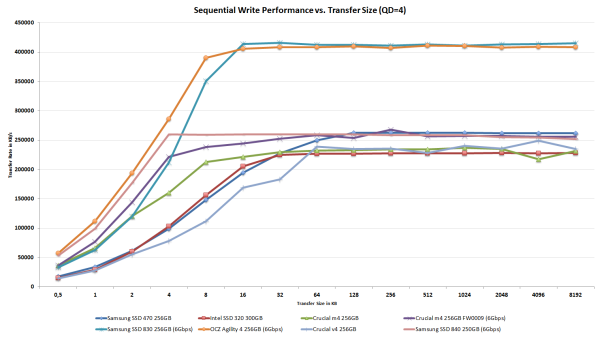Crucial v4 (256GB) Review
by Kristian Vättö on November 22, 2012 1:01 PM ESTPerformance vs. Transfer Size
ATTO is a great tool for quickly measuring performance at different transfer sizes. The v4 performs similarly to the m4 connected to SATA 3Gbps port in the read test but its write performance is poor between transfer sizes of 2KB and 64KB.












44 Comments
View All Comments
andrejg - Tuesday, November 27, 2012 - link
I thought the same until - I had two PC's of similar capacity with windows 8 side by side. One had Samsung SSD 830 256 and the other had Crucial v4 128.Difference was noticable, from start/boot to installations and other operations. They are both very good comparing to HDD, but Samsung rocks and Crucial is only faster than HDD.
supercoffee - Thursday, November 22, 2012 - link
I'm no expert, but I thought SSD read performance was generally always higher than write performance. If this is the case, then the average read and write speed charts on the Storage bench 2011 page are wrong and should be fixed. Thanks.Kristian Vättö - Friday, November 23, 2012 - link
When you read data, you have to fetch it from the actual NAND. When writing, you can first cache the data and write it to NAND at a later date (works well with small IOs as they can then be combined to increase throughput). Writing to a cache is extremely fast and hence write speeds are often higher.Sequential read speed at bigger IO sizes is definitely higher, but most of the actual usage IOs are somewhat random and small in size. Big sequential IOs are easy to read because you get the benefit of multiple dies but the smaller the IO and queue depth, the less interleaving can be done. For example, 4KB random read at QD1 is often limited by NAND bandwidth because you can only read from one NAND die at the time, which isn't all that fast.
iwod - Thursday, November 22, 2012 - link
I mean the majority of cost for SSD goes to the NAND, there is no point trying to save a dollar or two and offer such inferior product, Those who are going to spend $100 and buy comparatively expensive HDD replacement would not have cared about the $10 dollars difference if it offer something like 5x less performance.Those who only owns a SATA 1 / 2 Port would have wanted a much faster SSD now for so they could get faster performance if they upgraded their MB.
So in reality this strange line of product is aiming squarely at those who have absolutely no clue about SSD performance or OEMs builders who could simply rip more off from customers.
The only niche i think this fits in are PATA, UATA port, where old computers could immensely benefits from SSD.
kmmatney - Friday, November 23, 2012 - link
What this review is sorely lacking is any sort of real-life experience with the drive. Does it still "feel" like an SSD in actual use? Does windows boot up fast? I'd buy a lower performing Crucial SSD over a faster OCZ drive, as long as itis "fast enough".toine_r - Saturday, November 24, 2012 - link
Unfortunately, I bought one (the 128Gb version) before this article has been published (17-11-2012).I strongly suggest buying another "real" SSD, because this one is not fast enough for day to day use, even for replacing a HDD.
I replaced a 5400rpm HDD with it on a netbook running Ubuntu, and the SDD was slower than the HDD for some operations (typically, installing packages and applications took hours on the SSD).
Experience on windows may be better, but its probably safer to buy another one.
Dustin Sklavos - Friday, November 23, 2012 - link
I love Crucial's stuff and would easily recommend the m4 personally, but...This has to be one of the worst products we've reviewed all year. I'm kind of in awe of how terrible it really is, the only way you could justify it compared to what else is available is to sell it at half the cost of any other SSD with comparable capacity.
cjs150 - Friday, November 23, 2012 - link
Great response Dustin - I only which I had written it.KAlmquist - Saturday, November 24, 2012 - link
With a metal case (instead of plastic) and synchronous NAND (instead of asynchronous) it's like Crucial wasn't even trying to hit a price point where an SSD with the Phison controller would make sense.Impulses - Wednesday, November 28, 2012 - link
As brutal as the review was, it was still too kind! The first budget SSD that one of the major players put out (Intel's X25-V) still manages random read/write performance that's about 3x faster! Granted that drive had abysmal sequential writes (as bad as a bad 5,400 drive), but it'd still make a better OS drive (provided you could live with 40GB!).